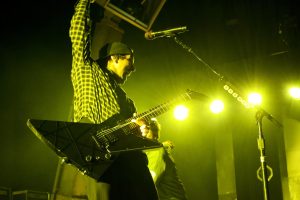University politics in Lebanon on national stage
October 28, 2009
Henry Kissinger famously quipped that, “university politics are vicious precisely because the stakes are so small.” Often showing up to school dressed in suits and ties, Suffolk University’s student leadership, in the words of Student Government Association (SGA) Member-at-Large, Gaetano Zagami, “believe that what they are doing is serious business.” Suffolk University’s student government office and its environs are often a place of fierce political debate. Campus’s media organs are the territory of many a hatchet-piece or policy article. Many in the SGA and other political circles have even held or hold jobs at the Massachusetts State House. While some students may consider the polemics and machinations found in university politics trivial or even ridiculous, halfway across the globe in Lebanon, university politics are of critical importance to the development and maintenance of democratic culture.
Lebanese student politics can be a serious, if not deadly business. The country is still living through the after effects of thirty years of Syrian occupation and a further political polarization in the country. This is further heightened by the sectarian nature of politics. The elections frequently mirror what is happening on a national stage. Student elections are regularly monitored by major political parties, newspapers and often have national significance in the small country. Also, national political groups regularly see universities as breeding grounds for future activists and political leaders.
Prior to Lebanon’s casting off of the Syrians, large numbers of pro-independence/anti-Syrian students spearheaded protests. At that time, student elections were some of the few free-democratic outlets that were not as overtly controlled by the regime. Student actions were frequently met with increasing force by pro-Syrian elements and political groups in the government. According to Amnesty
International, during the Syrian occupation, hundreds of students were held incommunicado, tortured and abused. The student protests eventually helped culminate into the wider 2005 Cedar Revolution which cast off Syrian dominance.
Even after the Syrian pullout, Lebanese Campuses are often nexuses for violent conflicts. In 2007 pro and anti-government students clashed at Beirut Arab University. The fighting left one student dead.
In 2005, at Lebanese American University (LAU), students supporting the Shia Muslim Hizballah and primarily Christian Free Patriotic Movement (both groups in the pro-Syrian March 8th Alliance, represented at LAU under the moniker of LAU Social) fought students belonging to the Christian Lebanese Forces (in the pro-Western March 14th Coalition, represented in the university under the Lebanese Student Front [L.S.F.] grouping). According to some students, thirty members of Hizballah were sent to the hospital, with an unknown level of L.S.F. supporters injured.
Due to the potential for violence, schools like LAU have banned any political activism on their campuses. Despite this, campus elections are still held and political groups are unofficially active. The ban has not put a damper on campus activism. “Even though our activity is kind of limited, people are not stupid,” remarked Jeffery Srour, an L.S.F. member and former LAU student council member.
“Everyone knows who we are and what we represent. We just happen to talk about politics with many people,” Srour said with a smile.
Often, the national political situation effects both students, teachers and university administrations. Vice President of the LAU Student Council, Hany Rizk, explained that the tense situation had much to do with, “the whole country is politicized, it makes it very hard to get anything done.” Unlike the United States, where politics and academia regularly collide, political affiliations in Lebanon can spell disaster for a student. Thomas Khairallah, a member of the L.S.F., said that politics were so influential in the school administration that, “many of the guys lost their financial aid because they worked with L.S.F. … Some friends lost their part-time jobs in LAU because they’re L.S.F.”
Regardless of the conditions, fighting and threat to their academic wellbeing, students involved in the political field take their tasks seriously. Student Charbel Bou Maroun, commented that “students constitute a ‘revolutionary’ portion of society, we are always moving.” This may be true for student politics in both the U.S. and Lebanon. Nevertheless, while Suffolk’s students often dodge the occasional pen thrown their way, their compatriots in Lebanon are often evading the bullets.





